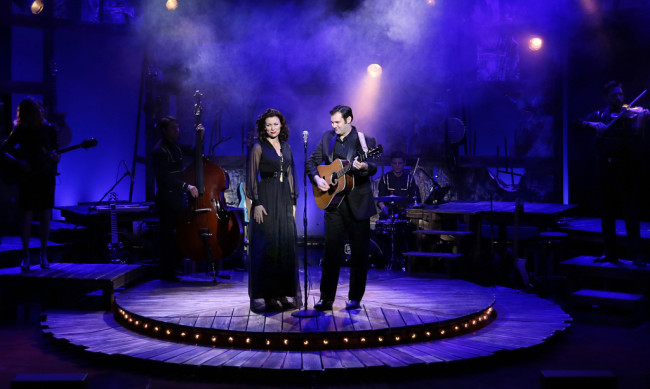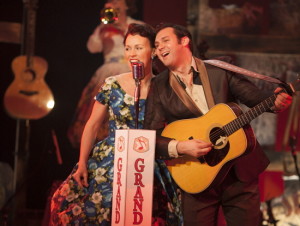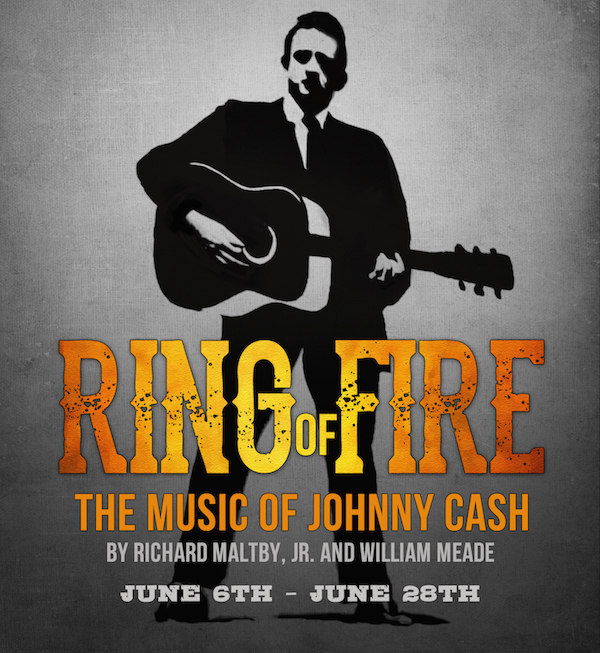As a walking contradiction, partly truth, partly fiction, the musicalization of the life of Johnny Cash suits the man in black. Well known for its revitalizing revivals of obscure, outdated, and lost musical gems, Infinity Theatre Company settles into the 2015 Annapolis summer with a surefire shot at success. Ring of Fire: The Music of Johnny Cash, created and conceived by Richard Maltby Jr., and William Meade adapted from the Broadway production by Maltby Jr. and Jason Edwards, is exactly as it sounds— the music of Johnny Cash thrown together in another jukebox musical. Directed by Amy Jones, the musical had one of the briefest runs in Broadway history and is having an even briefer one now this 2015 summer season.

The faults of the book and concept of the musical on the whole are numerable and outweigh even the impressive Infinity Theatre Company’s “Midas-touch” ability of success that they have had with previous revivals of poorly received musicals such as I Do! I Do! and Dames at Sea (which they are launching a revival of on Broadway in the near future.) However, these problems cannot be blamed on the company and they deserve tremendous credit for attempting to make this musical worth its weight in salt. The original creator Richard Maltby Jr.(along with original conceptionalist Jason Edwards and current conceptionalist William Meade) has selected a great deal of recognizable songs from the legendary performer that the world has grown to know and love, but his first mistake is in assigning them to be sung by the other “characters” in the show.
The story is loose at best; if the songs were to be subtracted from the performance there would be little more than a few minutes of fun facts and interesting tidbits about Johnny Cash and this is unfortunately the poor craftsmanship of Maltby Jr, and his creative devisors. It is difficult enough that the book does not call for the cast to actually play the character of Johnny Cash and June Carter Cash— they are only listed by their actual names— but then sprinkled throughout are moments in the show where clearly these performers are trying to be the iconic figures.
Infinity’s only creditable downfall is their casting choice of Ben Hope as the “Johnny Cash” figure in the show. Not for a lack of talented voice, but simply for a lack of not looking or sounding much like Johnny Cash. While this may be intentional as the script never calls for him to technically be Johnny Cash, it doesn’t help the already convoluted concept of the storyline. Hope is a talented performer and a great many times throughout the show actually sounds like Elvis in both his speaking and singing voice. Costume Designer Tristan Raines takes a long time to fully evolve the infamous “man in black look” for Hope, which juxtaposed against the fact that Hope has limited resemblance to the man, further spurns confusion. Raines, however, does an excellent job of outfitting the cast for the era and making the girls’ dress-skirts flare out with decade-appropriate crinoline and patterns to match the times.
Director Amy Jones does have some very clever blocking concepts on Scenic Designer Paul Tate dePoo III’s stage. The rustic and cobbled-together look of an old bandstand layered in newspaper articles and magazine covers sets the mood for the old-world country journey that the audience is about to take. Jones moves the performers along the layered tiers of the stage’s “docks” during “Five Feet High and Rising” and spaces Katie Barton (playing the June Carter Cash persona) out perfectly when she’s meant to be at the Grande Ole Opera singing with the Carter Family. Barton is also situated off to the side of the stage in an angel light (crafted by Lighting Designer Jimmy Lawlor) during “I Still Miss Somebody” creating a very touching moment.

While Hope lacks the iconic neck-jerking gesture that Johnny Cash was so often seen doing while playing his guitar, he brings an enthusiastic spirit to telling the stories and does have a sturdy voice that is pleasant enough to hear even if it doesn’t sound like the man whose music he’s singing. Hope should be commended for the breakneck speed with which he races through “Hey, Porter,” really amplifying the energy of that song to an extremely enjoyable level. When singing “Jackson” with Barton, which happens a few times throughout the show, the pair sing right into each other’s faces, and reflect a fond sentimentality of one another in this song.
Barton does have the slightly brassy country crying sound of June Carter Cash and really connects emotionally to songs like “Far Side Banks of Jordan” and “Flesh and Blood” a trio piece shared with Hope and Lori Eure. Both women take on the delicate tenderness of women who love Johnny Cash in this number, Barton taking on the unyielding love of a dedicated wife and Eure taking on that of an unconditional mother. Eure adds beautiful harmonies to “Daddy Sang Bass” early on and serves as every matronly figure throughout the performance. Her and Barton both have excellent pattering skills as showcased in the show’s finale “I’ve Been Everywhere.”
Spiff Wiegand and Silas Moores are the remaining two instrumentalist/vocalists of the show, with Wiegand being the one to watch as he easily plays almost a dozen instruments throughout the performance. Both are featured as the narrative support to the story, the backup to Cash’s band, and various other characters throughout but both men also receive the opportunity to try on an iconic Cash song for themselves. Wiegand delivers a hearty rendition of “Cocaine Blues” (and while it’s unclear why it is this way in the book, he does it a great deal of justice.) Moores lays heavy into “Delilah’s Gone” a lesser recognized Cash classic. Both men have exceptional voices and showcase their patter skills with the women in the show’s closing number.
If you go into the show with the mindset of enjoying the music and not expecting a Johnny Cash impersonator or much of a fluid storyline (though what details are there do flow in a linear fashion) then the show will be a thoroughly enjoyable afternoon of musical theatre entertainment. Professional quality in Annapolis, and it does offer a chance to see the extremely rarely produced show.
Running Time: 2 hours and 30 minutes with one intermission
Ring of Fire: The Music of Johnny Cash plays through June 28, 2015 at Infinity Theatre Company at The Children’s Theatre of Annapolis Complex— 1661 Bay Head Road in Annapolis, MD. For tickets call the box office at (877) 501-8499 or purchase them online.

